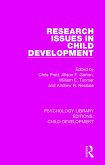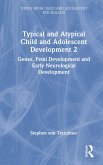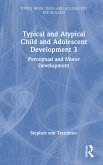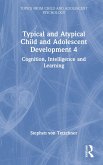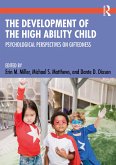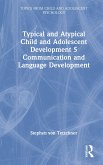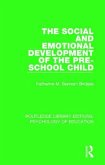Research Issues in Child Development
Herausgeber: Pratt, Chris; Tunmer, William E.; Garton, Alison F.
Research Issues in Child Development
Herausgeber: Pratt, Chris; Tunmer, William E.; Garton, Alison F.
- Gebundenes Buch
- Merkliste
- Auf die Merkliste
- Bewerten Bewerten
- Teilen
- Produkt teilen
- Produkterinnerung
- Produkterinnerung
First published in 1986, this authoritative book contains a selection of original, research based, reports of studies conducted in Australia and New Zealand in the field of Child Development.
Andere Kunden interessierten sich auch für
![Research Issues in Child Development Research Issues in Child Development]() Research Issues in Child Development31,99 €
Research Issues in Child Development31,99 €![Typical and Atypical Child and Adolescent Development 2 Genes, Fetal Development and Early Neurological Development Typical and Atypical Child and Adolescent Development 2 Genes, Fetal Development and Early Neurological Development]() Stephen Von TetzchnerTypical and Atypical Child and Adolescent Development 2 Genes, Fetal Development and Early Neurological Development175,99 €
Stephen Von TetzchnerTypical and Atypical Child and Adolescent Development 2 Genes, Fetal Development and Early Neurological Development175,99 €![Typical and Atypical Child Development 3 Perceptual and Motor Development Typical and Atypical Child Development 3 Perceptual and Motor Development]() Stephen Von TetzchnerTypical and Atypical Child Development 3 Perceptual and Motor Development174,99 €
Stephen Von TetzchnerTypical and Atypical Child Development 3 Perceptual and Motor Development174,99 €![Typical and Atypical Child Development 4 Cognition, Intelligence and Learning Typical and Atypical Child Development 4 Cognition, Intelligence and Learning]() Stephen Von TetzchnerTypical and Atypical Child Development 4 Cognition, Intelligence and Learning188,99 €
Stephen Von TetzchnerTypical and Atypical Child Development 4 Cognition, Intelligence and Learning188,99 €![The Development of the High Ability Child The Development of the High Ability Child]() The Development of the High Ability Child49,99 €
The Development of the High Ability Child49,99 €![Typical and Atypical Child and Adolescent Development 5 Communication and Language Development Typical and Atypical Child and Adolescent Development 5 Communication and Language Development]() Stephen Von TetzchnerTypical and Atypical Child and Adolescent Development 5 Communication and Language Development174,99 €
Stephen Von TetzchnerTypical and Atypical Child and Adolescent Development 5 Communication and Language Development174,99 €![The Social and Emotional Development of the Pre-School Child The Social and Emotional Development of the Pre-School Child]() Katharine M. Banham BridgesThe Social and Emotional Development of the Pre-School Child150,99 €
Katharine M. Banham BridgesThe Social and Emotional Development of the Pre-School Child150,99 €-
-
-
First published in 1986, this authoritative book contains a selection of original, research based, reports of studies conducted in Australia and New Zealand in the field of Child Development.
Produktdetails
- Produktdetails
- Verlag: Routledge
- Seitenzahl: 230
- Erscheinungstermin: 7. Dezember 2017
- Englisch
- Abmessung: 222mm x 145mm x 16mm
- Gewicht: 426g
- ISBN-13: 9781138501010
- ISBN-10: 1138501018
- Artikelnr.: 75272817
- Herstellerkennzeichnung
- Libri GmbH
- Europaallee 1
- 36244 Bad Hersfeld
- gpsr@libri.de
- Verlag: Routledge
- Seitenzahl: 230
- Erscheinungstermin: 7. Dezember 2017
- Englisch
- Abmessung: 222mm x 145mm x 16mm
- Gewicht: 426g
- ISBN-13: 9781138501010
- ISBN-10: 1138501018
- Artikelnr.: 75272817
- Herstellerkennzeichnung
- Libri GmbH
- Europaallee 1
- 36244 Bad Hersfeld
- gpsr@libri.de
Chris Pratt, Alison F. Garton, William E Tunmer, Andrew R. Nesdale
Contributors. Preface. Section 1: Cognitive Issues in Development 1. The
Effects of Prenatal and Postnatal Twin Environments on Development 2.
Cognitive Functioning of Children Born with Very Low Birth Weight 3. Search
for Sounding Objects by One-Year-Old Infants 4. Failure on Piagetian Tasks:
Misinterpretation of the Question? 5. The Effect of Context on the Memory
Performance of Children 6. Children's Collaboration and Conflict in Dyadic
Problem Solving 7. Scholastic Ability in Left-Handers 8. Adolescents'
Organisational Strategies for Planning Errands Section 2: Language and
Reading Development 9. On Children's Comprehension of Metaphor 10.
Children's Understanding of Ironic Utterances 11. Phonological Awareness
and Learning to Read 12. Syntactic Processing in Children Varying in
Reading Skill Profile 13. Do Twins and Singletons Have Similar Language and
Reading Problems? Section 3: Perceptual Motor Development 14. Development
of Perceptual Motor Abilities in Children from 5 Years to Adults 15.
Perceptual Motor Development in Children's Drawing Skill 16.
Vestibular-Postural and Oculomotor Control Problems in Learning Disabled
Children Section 4: Social Aspects of Development 17. Daycare, Rules and
the Heteronomy Construct 18. Reflection-Impulsivity and Delay of
Gratification Choice 19. Parental Attitudes to Early Childhood Care 20.
Parents' Satisfaction with Progress and Beliefs About Stability of Traits
21. 'Difficult' and 'Easy' Periods for Young Siblings of Disabled People
22. Social Distance and Life Goals as Bases for Intergenerational
Perceptions.
Effects of Prenatal and Postnatal Twin Environments on Development 2.
Cognitive Functioning of Children Born with Very Low Birth Weight 3. Search
for Sounding Objects by One-Year-Old Infants 4. Failure on Piagetian Tasks:
Misinterpretation of the Question? 5. The Effect of Context on the Memory
Performance of Children 6. Children's Collaboration and Conflict in Dyadic
Problem Solving 7. Scholastic Ability in Left-Handers 8. Adolescents'
Organisational Strategies for Planning Errands Section 2: Language and
Reading Development 9. On Children's Comprehension of Metaphor 10.
Children's Understanding of Ironic Utterances 11. Phonological Awareness
and Learning to Read 12. Syntactic Processing in Children Varying in
Reading Skill Profile 13. Do Twins and Singletons Have Similar Language and
Reading Problems? Section 3: Perceptual Motor Development 14. Development
of Perceptual Motor Abilities in Children from 5 Years to Adults 15.
Perceptual Motor Development in Children's Drawing Skill 16.
Vestibular-Postural and Oculomotor Control Problems in Learning Disabled
Children Section 4: Social Aspects of Development 17. Daycare, Rules and
the Heteronomy Construct 18. Reflection-Impulsivity and Delay of
Gratification Choice 19. Parental Attitudes to Early Childhood Care 20.
Parents' Satisfaction with Progress and Beliefs About Stability of Traits
21. 'Difficult' and 'Easy' Periods for Young Siblings of Disabled People
22. Social Distance and Life Goals as Bases for Intergenerational
Perceptions.
Contributors. Preface. Section 1: Cognitive Issues in Development 1. The
Effects of Prenatal and Postnatal Twin Environments on Development 2.
Cognitive Functioning of Children Born with Very Low Birth Weight 3. Search
for Sounding Objects by One-Year-Old Infants 4. Failure on Piagetian Tasks:
Misinterpretation of the Question? 5. The Effect of Context on the Memory
Performance of Children 6. Children's Collaboration and Conflict in Dyadic
Problem Solving 7. Scholastic Ability in Left-Handers 8. Adolescents'
Organisational Strategies for Planning Errands Section 2: Language and
Reading Development 9. On Children's Comprehension of Metaphor 10.
Children's Understanding of Ironic Utterances 11. Phonological Awareness
and Learning to Read 12. Syntactic Processing in Children Varying in
Reading Skill Profile 13. Do Twins and Singletons Have Similar Language and
Reading Problems? Section 3: Perceptual Motor Development 14. Development
of Perceptual Motor Abilities in Children from 5 Years to Adults 15.
Perceptual Motor Development in Children's Drawing Skill 16.
Vestibular-Postural and Oculomotor Control Problems in Learning Disabled
Children Section 4: Social Aspects of Development 17. Daycare, Rules and
the Heteronomy Construct 18. Reflection-Impulsivity and Delay of
Gratification Choice 19. Parental Attitudes to Early Childhood Care 20.
Parents' Satisfaction with Progress and Beliefs About Stability of Traits
21. 'Difficult' and 'Easy' Periods for Young Siblings of Disabled People
22. Social Distance and Life Goals as Bases for Intergenerational
Perceptions.
Effects of Prenatal and Postnatal Twin Environments on Development 2.
Cognitive Functioning of Children Born with Very Low Birth Weight 3. Search
for Sounding Objects by One-Year-Old Infants 4. Failure on Piagetian Tasks:
Misinterpretation of the Question? 5. The Effect of Context on the Memory
Performance of Children 6. Children's Collaboration and Conflict in Dyadic
Problem Solving 7. Scholastic Ability in Left-Handers 8. Adolescents'
Organisational Strategies for Planning Errands Section 2: Language and
Reading Development 9. On Children's Comprehension of Metaphor 10.
Children's Understanding of Ironic Utterances 11. Phonological Awareness
and Learning to Read 12. Syntactic Processing in Children Varying in
Reading Skill Profile 13. Do Twins and Singletons Have Similar Language and
Reading Problems? Section 3: Perceptual Motor Development 14. Development
of Perceptual Motor Abilities in Children from 5 Years to Adults 15.
Perceptual Motor Development in Children's Drawing Skill 16.
Vestibular-Postural and Oculomotor Control Problems in Learning Disabled
Children Section 4: Social Aspects of Development 17. Daycare, Rules and
the Heteronomy Construct 18. Reflection-Impulsivity and Delay of
Gratification Choice 19. Parental Attitudes to Early Childhood Care 20.
Parents' Satisfaction with Progress and Beliefs About Stability of Traits
21. 'Difficult' and 'Easy' Periods for Young Siblings of Disabled People
22. Social Distance and Life Goals as Bases for Intergenerational
Perceptions.


